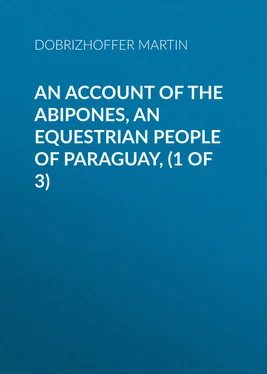Martin Dobrizhoffer - An Account of the Abipones, an Equestrian People of Paraguay, (1 of 3)
Здесь есть возможность читать онлайн «Martin Dobrizhoffer - An Account of the Abipones, an Equestrian People of Paraguay, (1 of 3)» — ознакомительный отрывок электронной книги совершенно бесплатно, а после прочтения отрывка купить полную версию. В некоторых случаях можно слушать аудио, скачать через торрент в формате fb2 и присутствует краткое содержание. Жанр: foreign_antique, foreign_prose, на английском языке. Описание произведения, (предисловие) а так же отзывы посетителей доступны на портале библиотеки ЛибКат.
- Название:An Account of the Abipones, an Equestrian People of Paraguay, (1 of 3)
- Автор:
- Жанр:
- Год:неизвестен
- ISBN:нет данных
- Рейтинг книги:3 / 5. Голосов: 1
-
Избранное:Добавить в избранное
- Отзывы:
-
Ваша оценка:
- 60
- 1
- 2
- 3
- 4
- 5
An Account of the Abipones, an Equestrian People of Paraguay, (1 of 3): краткое содержание, описание и аннотация
Предлагаем к чтению аннотацию, описание, краткое содержание или предисловие (зависит от того, что написал сам автор книги «An Account of the Abipones, an Equestrian People of Paraguay, (1 of 3)»). Если вы не нашли необходимую информацию о книге — напишите в комментариях, мы постараемся отыскать её.
An Account of the Abipones, an Equestrian People of Paraguay, (1 of 3) — читать онлайн ознакомительный отрывок
Ниже представлен текст книги, разбитый по страницам. Система сохранения места последней прочитанной страницы, позволяет с удобством читать онлайн бесплатно книгу «An Account of the Abipones, an Equestrian People of Paraguay, (1 of 3)», без необходимости каждый раз заново искать на чём Вы остановились. Поставьте закладку, и сможете в любой момент перейти на страницу, на которой закончили чтение.
Интервал:
Закладка:
The major part of the Spaniards live in hamlets, farms, and little villages, where the convenience of land and pasturage is greatest: cities, except the metropolis, they have none. Villa Rica and Curuquati are meagre places, mere shades of towns, the inhabitants being almost obliterated, by frequent migrations, from fear of the Portugueze. Xerez and Ciudad Real del Guayra, which once boasted the name of cities, have long since been destroyed by the incursions of the Portugueze who, assembled in the city of St. Paulo, enjoy, to this day, the finest parts of Guayra, the Spaniards vainly lamenting the seizure of the noblest part of their territory.
Of the ancient towns, where the Spaniards settled the Indians they had subdued with arms, or won by religion, there remain Caazapà, Yuti, Ytape, and Yta, which are governed by Franciscans. Caazapà contains about two hundred families, and exceeds the rest in the number of its herds. Ytape contains about twenty families; Yuti and Yta, somewhat more. They are all governed by parish priests. Atira and Altos together form one little town. Quarambare and Jobati are both inconsiderable. Yaguaron consists of two hundred families. The Indian inhabitants are mostly employed in the service of the Spaniards, and consequently in populousness, morality, and the appearance of their churches, vastly inferior to our Guaranies, who, exempted from private servitude, are accountable solely to the Catholic King.
In the dominions of Paraguay are three other towns, founded and preserved by men of our order. St. Joachim, situate in latitude 24° 49´, and longitude 321°, on the banks of the Yù, which, in 1767, numbered 2017 Christian inhabitants, named Ytatines or Ytatinguays. As early as 1697 about four hundred persons were discovered in the neighbouring woods of Taruma, by Father Bartholomew Ximenez and Francisco Robles, and assembled in the town of Nuestra Senhora de Sta. Fè, 150 leagues distant from Sta. Fè, where they held the Christian religion many years. But love of freedom at length bore them back to their original forests, whence they were in vain recovered, by fathers of our order, in the year 1721. In the place called Taruma, a little town was built for them, which, in 1723, contained three hundred souls. But partly from the poorness of the pastures, partly from the disturbances raised by the Spaniards, on occasion of Joseph Antequera's obtruding himself upon them as governour, the Ytatines were again removed to Nuestra Senhora de Sta. Fè, where they remained ten years, and bore a good report. But the bloody insurrection of the neighbouring Spaniards, famine, and the wasting pestilence of the small-pox, compelled them, in 1734, to take refuge in the forests they had formerly occupied. On the instant, Fathers Sebastiano de Yegros, Juan Escandon, Felix Villagarzia, and Luke Rodriguez, were sent to explore the lurking-places of the fugitives, and, after a laborious journey of eighteen months, returned unsuccessful. At length, in 1745 accident effected what labour could not. By the command of the superiors, Father Sebastiano de Yegros began the search, and after a forty-nine days journey of matchless difficulty, found the Ytatines in the woods of Tapebo. No opposition being made on their parts, a town was built for them in their native soil. Cattle of all kinds, clothes, axes, household furniture, and a few masters of music, and other arts, being sent from the old town, every thing went on favourably.
But a sudden terror interrupted the prosperous course of the new colony. The Guaycurus or Mbayas began to devastate the neighbouring estates of the Paraguayrians with slaughter and depredation. The Ytatines, thinking the marauders already upon them, lost all sense of safety. Alarmed by perpetual rumours of the enemy's approach, they spent their nights without sleep, and in open daylight still dreamt of peril. To this another distress was added: the want of water. The Fathers therefore judged it expedient to remove twenty-five leagues southwards, where the intermediate forests could protect them against the Guaycurus, and afford them a constant supply of water. In 1753, having left their church, and the residence of the Fathers, they built a town on the spur of the moment, which was regulated after the model of the Guarany colonies, increased by the accession of new families, and settled on a good foundation. To this city I devoted eight years of unregretted labour. When D. Manuel de la Torre, Bishop of Asumpcion, payed us his accustomed visit, he beheld with admiration the rigid Christian discipline, the accuracy of divine worship, and universal good order established among men so lately inhabitants of the woods. D. Carlos Murphy, an Irishman, and governor of Paraguay, was delighted during his five days' visit at my house with the dexterous management displayed by the Indians as well of their musical instruments, as of their weapons.
Another colony in the jurisdiction of Paraguay, that of St. Stanislaus, is the offshoot of St. Joachim. For the Ytatines, discovered by the joint efforts of the Indians and the Fathers of St. Joachim in woods situate between the rivers Caapivarỹ, Yeyuỹ, and Tapiraguaỹ, were prevailed upon to assemble in one place and embrace the Christian religion. Arduous, indeed, was the task of persuading them to leave their native woods; for, accustomed to the shade of towering trees, they shun the exposed and sunny plain, where they think their lives and liberties daily endangered. Father Sebastiano de Yegros lived a year in the woods with the savages; at the end of which time, he persuaded them to relinquish their woods, and occupy the plains bordering on the river Tapiraguaỹ, whither Fathers Manuel Guttierrez and Joseph Martin Mattilla bought cattle and the necessaries of subsistence, and in 1751 erected a chapel and dwellings. Softened by the kindness and liberality of the Fathers, they became docile and conformable to Christian discipline. In my visits to this town, I could not but admire the gentle disposition and compliance with divine regulations, displayed in a people bred in woods and thickets. In a few years the town was increased by the accession of Indians, won over by Fathers Antonio Planes, Thaddeus Emis, a Bohemian, and Antonino Cortada, after arduous journeys amid pathless wilds. This colony lies in latitude 24° 20´, and in longitude 321° 35´. In 1767 it contained upwards of two thousand three hundred inhabitants, who had formerly wandered over those woods, where the Spaniards gather the herb of Paraguay. So that from the towns of St. Joachim and St. Stanislaus, a lucrative trade is opened to the whole province by the removal of the savages; since which the Spaniards can fearlessly traverse the woods that produce the herb in question.
In confirmation of this, I will cite a remarkable instance. The remote forest of Mbaeverà abounds in the trees of the leaves of which the herb of Paraguay is made. To prepare this, a multitude of Spaniards, with the necessary oxen, horses, and mules, are sent from the city of Asumpcion. The forest through which their journey lay, a tract blocked up with mingled trees and reeds, and impeded with twenty-six rivers, and as many long marshes, is full eighty leagues in extent, in which space you will rarely find ten paces of plain land. To render this passable, it was requisite to fell trees, to throw bridges over the rivers, to give the marshes consistence with bundles of boughs, and to level the declivities. When these things had been effected with equal labour and expense, huts were required to receive the Spaniards, hedges to inclose the beasts, and a frame work formed of stakes partly driven into the ground, partly laid cross-wise, to roast the leaves on. The necessary preparations made, the Spaniards were sent to the woods where the leaves were gathered. But their superintendant Vilalba lit upon a hovel, which, though empty, evidently belonged to the savages. Struck with the unexpected occurrence, he hastened to his companions with the news, which instigated them to immediate flight, and to think of saving their lives instead of gathering the herb of Paraguay. Nor do I, on this account, think them to be accused of cowardice or sloth. For in seeking the trees from which they lopped the branches, they did not traverse the woods in one body, but separately, and when they returned home, they were loaded with burthens. Moreover from carrying no weapon but the knife they used, they were always undefended from the assault of the savages. Abandoning therefore the business on which they had come, they returned to the city on their mules and horses. Vilalba, quitting his associates, turned aside to the city of St. Joachim, and related to the Fathers what he had seen and done, conjuring them to endeavour by every possible means to bring the savages to their town. The Fathers readily began the attempt. But, perceiving themselves unequal to such a journey, dispatched a chosen band of Indians, under the conduct of Vilalba, to search out the savages, and sound their inclinations. After some days, having imprudently consumed their provisions, they turned back before they had even approached the station, which the Indians were supposed to hold. So that the glory of finding these savages was reserved to the author of this work.
Читать дальшеИнтервал:
Закладка:
Похожие книги на «An Account of the Abipones, an Equestrian People of Paraguay, (1 of 3)»
Представляем Вашему вниманию похожие книги на «An Account of the Abipones, an Equestrian People of Paraguay, (1 of 3)» списком для выбора. Мы отобрали схожую по названию и смыслу литературу в надежде предоставить читателям больше вариантов отыскать новые, интересные, ещё непрочитанные произведения.
Обсуждение, отзывы о книге «An Account of the Abipones, an Equestrian People of Paraguay, (1 of 3)» и просто собственные мнения читателей. Оставьте ваши комментарии, напишите, что Вы думаете о произведении, его смысле или главных героях. Укажите что конкретно понравилось, а что нет, и почему Вы так считаете.












